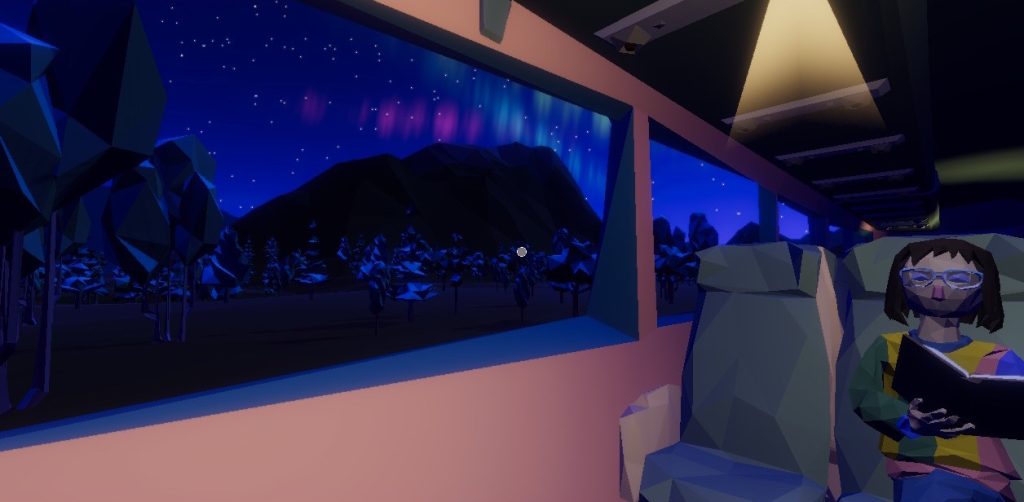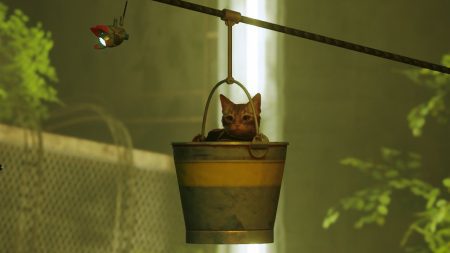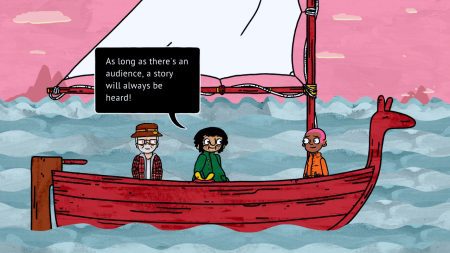Glitchhikers: The Spaces Between, out on March 31 on PC/Mac and Nintendo Switch by indie dev Silverstring Media Inc., is a quiet little adventure game about traveling at night and the intimate conversations we have with ourselves and with strangers.
The Journey, Not the Destination
Players begin by choosing to travel by car or train; later, you can unlock a walk in a park, or bounce around in zero gravity around an airport terminal. Players can initiate conversations with other travelers, or are encouraged to reflect to probing narrations from late night talk radio.
Glitchhikers could be the perfect game to play when you’re a little sad and/or alone at night. It’s perfect for when you need the sensation of safe connections and “Hey, man, life is crazy,” type conversations.
The conversation topics range from myths to grief to breakups to socialism to the origin of the universe to self-love. The game features thoughtful mechanics that empower you to end any conversation, gently, at any time if it ever segues into a space you don’t want to explore.
The game is strongest at evoking a mood. The art style is entrancing, with blocky triangles and cool tones that evoke a life in motion. Thoughtful, warm voice acting from a train conductor, a radio DJ, and a podcast host with synthy original music add a rich auditory layer.
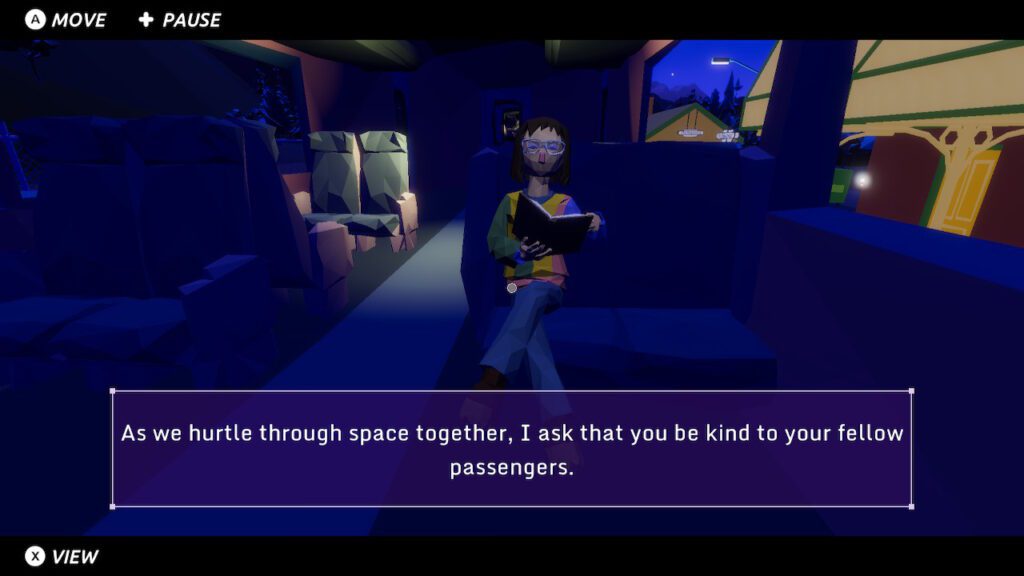
The Gameplay of Glitchhikers
Glichhikers isn’t a game for everyone or for any moment. It’s certainly a vibe, often bordering on something like therapy or a mindfulness app. The game’s opening screen encourages players only pursuing what feels good on the journey. I explored a conversation with the clerk at the game’s home base, a road-side convenience shop, and was pleasantly surprised to access a conversation tree that served as a physical and mental health check-in (“Have you drank a glass of water in the last hour?”).
Depending on what you want and what you need, it could be great, and it’s the moments where the game doesn’t fulfill its own promise that I become frustrated.
I began on the train, exploring conversations with NPCs and watching the mask-wearing busker perform. As we moved from place to place, the train conductor announced the stops for entrancing locations, like “Sublime.” The NPCs engaged in several beats of a conversation, then got up and moved to a different car; you can follow up with them, the conversation building and getting deeper the more times you do so.
These brief encounters were well written. I was curious and engaged, enjoying the power of gliding between spaces and seeking out intimate chats. The conversation mechanic, the core engagement of the game, is smooth and enjoyable with a significant array of response choices.
After a few chats, I exited at “Disappointment Lake,” curious about what I’d find. The game faded to black. Text appeared to let me know my journey was over, and that I could start another one. I assumed, incorrectly, that there would be a point to those named locations, and I was annoyed by both myself and the game that there was not.
The driving mode is much quieter, more peaceful. Vistas change from mountains to rocky plains, all hues in purple blacks with a starry sky above. Drifting between lanes is never dangerous. Sometimes there are cars on the road with you that you can never catch up to. I was alarmed, then, when the game made a clicking noise and a subtitle alerted me that I had picked up a passenger.
As a young woman traveling alone, I would never, ever pick up a hitchhiker, and not just because I was permanently scarred by a writing workshop reading of A Good Man Is Hard To Find by Flannery O’Connor.
By allowing a hitchhiker to enter in this way, the game had eliminated any sense of choice; even if I kicked them out, they had still invaded my space. I forced myself to shake off my fear (“It’s just a game!” I said out loud to myself) and tried to focus on the conversation. The chat was interesting enough, and my hitchhiker quietly left shortly thereafter with another click of the door, the car never stopping.
The park mode gave me another surprising moment of freeing role playing. As I walked in this lush geometric park of purples and greens and blues, I realized I was doing something I never in my lifetime have been able to (and think I never will) safely do: Walk alone in a park at night.
Distracting Inconsistencies
Glitchhikers feels like a passionate side project. It has the sensation of being an experiment in progress, content to play in the limitations it has created for itself.
The travel modes do not feel like they have been created equally, each held back by its own parameters. In the park, I can choose between branching paths (stopping to glance at a park map if I so choose), while listening to a podcast or music. The park itself is beautiful, and I enjoyed stopping to chat with a little long-faced robot looking fellow on a bench about experiencing nature. After reaching one vista in the park, I unknowingly activated an unskippable endgame credit roll that caught me off guard.
In comparison, there is no map or destination in the car mode. Players can only change lanes and adjust speed that doesn’t matter or significantly affect visuals. The radio is playing automatically, the DJ sometimes moving onto topics I don’t want to listen to. In real life or even within the game’s own park mode, I would be able to turn off the radio or switch the station; here, I’m trapped. Hitchikers enter my car without my consent, but I can tell them to go away at any time.
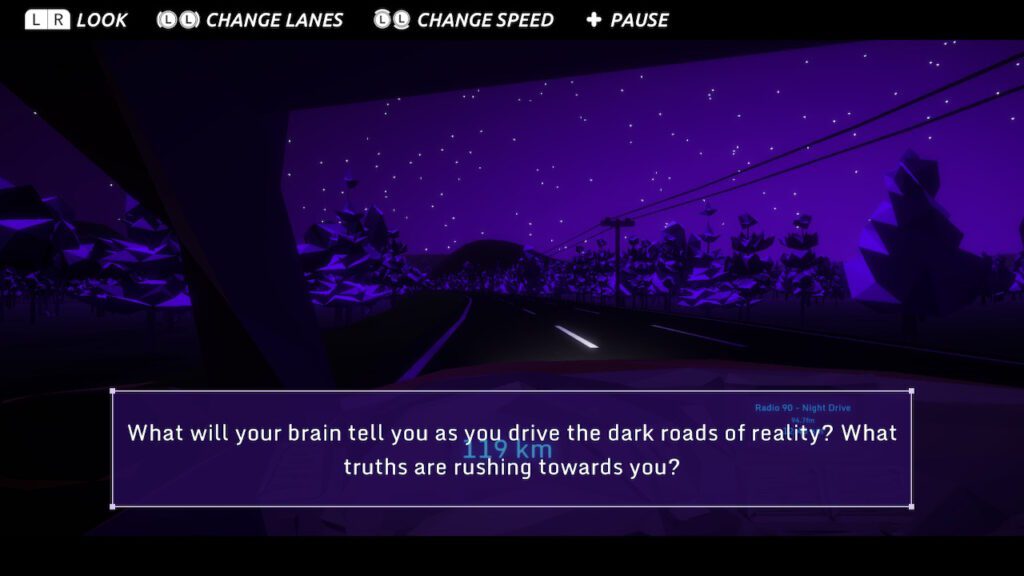
The airport terminal was my last and least explored mode; it had the most freedom of movement, allowing players to jump and glide around. But this didn’t feel like an adventure; I was stuck in an airport terminal, every flight canceled. Anyone who has ever been in an airport for hours longer than they wanted to be knows it’s not a romantic experience. Furthermore, the auditory choices in this level were so stressful (minor key music and newscasters talking with false urgency) that I exited within minutes.
After exploring the other travel modes, I came back to the train, and checked in with my NPC traveler friends only to discover I had been reset to the first conversation level for all of them. I would have to replay multiple conversation trees to regain my progress that I had accidentally lost by getting off the train the first time. Rather than feeling like an opportunity to experience the conversation anew, I felt punished.
These tonal inconsistencies were hiccups in an otherwise meditative experience.
Is Glitchhikers a Good Game?
In spite of its flaws and lack of freedom, Glitchhikers is a sweet, casual game for anyone who is a little sad and in need of human connection. And really, who isn’t feeling that way these days?
Score: 7.5/10
*Review code on Nintendo Switch received from publisher.
Amanda Tien (she/her or they) loves video games where she can pet dogs, punch bad guys, make friends, and have a good cry. She started writing for the site in 2020, and became an editor in 2022. She enjoys writing about mystery games, indies, and strong femme protagonists.
Her work has also been published in Unwinnable Monthly (click here to read her cover feature on Nancy Drew games), Salt Hill Journal, Poets.org, Litro Magazine, Public Books, and more. She was the Co-Founder and Editor-in-Chief of Columbia University's Culinarian Magazine, and served for two years as the Managing Editor of Aster(ix) Literary Journal.
She recently graduated with a MFA (Master of Fine Arts) in Creative Writing from the University of Pittsburgh. Her writing, art, graphic design, and marketing work can be viewed at www.amandatien.com.
She does not post a lot on social, but you can find her on X and on Instagram.


